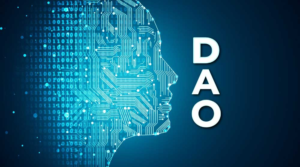
DAOs(Decentralised Autonomous Organisation) actually offer a new way to organise and work together. They use blockchain technology basically for fair and open decisions. This article shows what DAOs( Decentralised Autonomous Organisation) are and like how they operate.
Introduction to Decentralised Autonomous Organisations
A DAO actually runs without needing any central authority to operate. It depends on rules encoded as computer programs, also called smart contracts. Decisions are made by members, who typically have voting rights. DAOs exist on blockchains like Ethereum.
DAOs basically manage projects, funds and communities for everything worldwide. The main idea is letting people worldwide decide and collaborate openly. No single person has control, which improves trust and decentralisation in organisations.
How DAOs Operate: The Basics
At its heart DAO rules actually run on smart contracts. Rules are public and need group approval for any modification. DAO members use tokens to vote, propose and participate in changes. Voting actually decides outcomes in a fair and open way easily. Smart contracts execute decisions so no external influence is needed. Members come from anywhere and often stay anonymous or hidden. DAOs actually use blockchain mainly for security and transparent operations. Anyone reviews the ledger to see fairness and integrity of actions.
The History and Evolution of DAOs
The concept of DAOs started with blockchain development. DAO history began with the original DAO in 2016. It raised millions of dollars quickly. However, a hacking incident caused a major setback for DAOs. Despite this, the concept has grown since then.
Modern DAOs are much more secure now compared to the past. Over time, their applications expanded beyond finance into areas like NFTs and gaming. DAOs are still changing and solving old challenges with features basically. Rise of DAOs shows how technology actually changes governance traditions.
Key Features of Decentralised Autonomous Organisations
DAOs are kind of unique mostly because of their outstanding features. These features actually make DAOs stand out clearly in the digital world.
- DAOs let anyone join globally without regional or location limits.
- Everyone makes group decisions using fair voting processes democratically.
- Blockchain ensures transparency because all actions are openly public.
- Rules in DAO smart contracts need approval so changes do not happen.
- Members hold tokens to like impact on DAOs real operations always.
- DAOs remove intermediaries cutting down fees and transaction delays directly.
These create smooth frameworks for easy team collaboration in groups globally. Their implementation depends on automation and transparency.
Benefits of Using DAOs
DAOs offer many benefits actually for businesses, individuals and communities. They adapt to new innovation and current governance worldwide.
DAOs create transparency building member trust and reducing corruption fastly. Power is decentralised so no person really controls everything here. Automation in smart contracts actually improves efficiency and reduces total errors.
DAOs are global with broad participation and no geographic limits anywhere. Members often have direct voting rights, fostering democratic decision-making. These pros make DAOs ideal for anything needing openness and fairness. Flexible DAOs help peer organisations build trust small and large-scale.
Challenges and Risks Associated with DAOs
While DAOs have advantages, challenges cannot be ignored. Blockchains are DAO strengths but they kind of have weaknesses.
- Smart contract flaws kind of make DAOs vulnerable to hack attempts.
- Big-group decisions get slow and very inefficient overall sometimes.
- Unclear rules create legal challenges globally in jurisdictions mainly.
- Time zones make member communication a bit hard to coordinate easily.
- Limited voters weaken governance and hurt effectiveness basically in DAOs.
- Smart contract decisions end with very little chance for any changes.
DAOs hold risky challenges needing careful plans always beforehand. Members must address these concerns for long-term success.
Famous Examples of DAOs in Action
DAOs have proven their value in many real-world examples today. Uniswap DAO manages the famous Uniswap exchange kind of responsibility. MakerDAO actually governs the DAI stablecoin whole ecosystem well enough. ConstitutionDAO failed but made news by raising funds for the US Constitution.
Aragon and MolochDAOs focus on building platforms and funding projects together. Yield Guild type DAOs change online games through player-controlled decision-making. These examples show how much adaptable DAOs truly are. They actually span sectors in finance, technology gaming and governance areas.
How to Join or Contribute to a DAO
Joining DAOs needs blockchain basics skill and real interest from someone. Contribution usually begins by finding a DAO that aligns with your goals. Members often join by purchasing DAO governance tokens. Speaking in DAO groups shows what your value is actually definitely.
Many DAOs let users vote, propose ideas and share skills. Search DAO platforms like Discord Reddit where you interact directly. Each DAO onboarding actually depends on its particular goal uniquely. Always start with real research and some knowledge before going really.
What is the main purpose of a DAO?
The main goal is enabling decentralised collaboration and governance. DAOs empower teams to work democratically with open and shared goals.
How is decision-making conducted within a DAO?
Decision-making uses voting mechanisms, often proportional to token ownership. Votes decide outcomes while smart contracts act without people involved quickly.
What are some common use cases for DAOs?
Regular uses include charity work investments and governance of many applications. DAOs also drive community projects and support creators in NFT and blockchain spaces.
Do DAOs need coding skills to join?
No, not all members need coding skills for DAO participation. Many roles involve decision-making, communication, and analysis rather than technical contributions.
Members interact and shape DAOs without needing to understand programming fully. DAOs actually grow and reshape how people really work together globally. Though challenges exist DAO potential spans collaboration and open governance inclusively. Newbies or experts finding DAOs useful may explore exciting beginnings today. Take the first step to join a big teamwork revolution today.